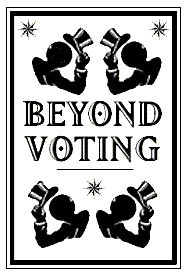|
POLITICS & COMMUNITY

Beyond Voting
by howard zinn
|
We have been suffering through our regular quadrennial election frenzy. The political machines, with the collaboration of the media, try frantically to persuade the citizenry that voting for this or that candidate, for A vs. B (or more accurately, A vs. A') will have enormous consequences.
Their very desperation to convey this message suggests the resistance of most Americans, who either will not vote, or will vote without enthusiasm. There is a bumper sticker (where else can we turn for wisdom?) which reads: "If the gods intended us to vote, they would have given us candidates."
It is hard to deny that some candidates are somewhat better than others. But the question should always be asked: better for whom? Let us not pretend that government policy falls equally on the CEO of Exxon and on the filling station attendant at the Exxon station, or on the 1% of the population whose stocks rose 400% this past decade, and the 80% whose incomes dropped by 15%.
If you are more concerned with the 80% of less-than-affluent Americans, than we can agree that some candidates will serve them better than others. From this point of view, Roosevelt was clearly preferable to Hoover, Carter to Reagan, and Clinton (barely) to Bush and Dole.
If we are talking about truly important change, then the voting booth is not the place to look. The history of this country suggests that where serious injustices have existed, they have not been remedied by the initiative of the President, the Congress, or the Supreme Court.
|
If we are talking about truly important change, then the voting booth is not the place to look.
|
The neat framework that looked so impressive on the blackboard of our junior high classroom -- the
three branches of government, the "checks and balances," "separation of powers," the Constitution -- have not, historically, been the critical elements in bringing about social change. The crucial changes in racial justice, economic reform, sexual equality, depended on the concerted action of citizens, on social movements acting outside the framework of governments, sometimes even outside the law.
The clearest example of this is the history of African-Americans. The end of slavery did not come as the result of the initiative of Abraham Lincoln, the Congress, or the Supreme Court. The Emancipation Proclamation, the 13th, 14th, and 15th Amendments, came only after thirty years of concerted effort by the anti-slavery movement. A movement that started with a handful of courageous blacks and whites, and became a powerful national force which pushed Lincoln and Congress towards the legislation that promised freedom.
|
The crucial changes in racial justice, economic reform, sexual equality, depended on the concerted action of citizens.
|
Indeed, once the Civil War was over, and a brief period of racial progress was brought to an abrupt halt, none of the three branches of government acted to enforce the new constitutional promise of equality. It took another movement, a hundred years later, led by black people in the murderous states of the deep South, to finally give some meaning to "the equal protection of the laws," and the constitutional right to vote.
Similarly, while the American industrial system boomed in the decades after the Civil War, the condition of working people remained abysmal -- child labor, the twelve-hour day, injury and death on the job all went unchallenged, indeed were kept in place, by government troops, police, and the courts. Change required direct action by working people themselves, black and white, men and women, engaging in the great labor struggles of the 19th and early 20th century, carrying on bitter and dramatic strikes against powerful corporations.
Thus was won the 8-hour day, and legislation which gave workers unemployment insurance, social security and other benefits. This led the wealthy classes, which had benefited from huge government subsidies since the birth of the nation, to cry "big government."
|
The decision to pull out of the Vietnam war did not come until great protests swept the nation.
|
In recent decades, we have seen important victories won and changes in the national consciousness brought about by movements for sexual equality, for disabled people, for the rights of gays and lesbians, for protection of the environment. The decision to pull out of the Vietnam war did not come until great protests swept the nation.
So, while we might still vote for A over A', those of us -- and I suspect it is a large majority -- who want to do something truly important about economic injustice, racial inequality and the other persistent problems of our society, would be best advised to devote our major energies to action beyond the ballot box. That is, to build a new national citizens movement dedicated to political and economic democracy -- a force so widespread, so powerful, that whoever is in office will have to pay attention.
Howard Zinn is Professor Emeritus of Political Science at Boston University. He is the author of fourteen books, including "A People's History of the United States : 1492-Present," a retelling of American history from the point of view of the powerless and disenfranchised.
© 1996 Howard Zinn, All Rights Reserved.

|

